






Established in 1969, the Texas Rural Water Association (TRWA) is a statewide nonprofit trade association with an active membership consisting of nearly 900 nonprofit water supply corporations, water districts, small-town water departments and investor-owned utilities. In addition, more than 150 water industry suppliers participate in TRWA activities as associate members. TRWA members provide water and wastewater service to 3 million customers throughout Texas.
TRWA is dedicated to helping directors, managers, operators and office professionals provide efficient service and clean, safe drinking water to their customers. Through on-site technical assistance, education and information exchange, TRWA helps its members better meet their needs as well as the needs of their customers.
President
Bruce Alexander Medina (District 2)
Vice-President
Robert Nettles Walker (District 13)
Secretary Mark Gardenhire Shackelford (District 1)
Treasurer Steve Adams Brown (District 4)
Immediate Past President Chris Boyd Denton (District 3)
Dave McMurry Bastrop (District 5)
Brian Macmanus Cameron (District 6)
Allen Knight North Collin (District 7)
Charles Beseda Hill (District 8)
Pat Allen Guadalupe (District 9)
Kent Watson Brazos (District 10)
Rachel Webb South Rains (District 11)
Paula Weber Kaufman (District 12)
Matthew Barrett Swift (District 14)
Main Office Line (512) 472-8591
Lara Zent Executive Director & General Counsel ext. 101
Jason Knobloch Deputy Executive Director ext. 137
Larry Bell Technical Assistance Director ext. 138
Mary Alice
Boehm-McKaughan Assistant General Counsel ext. 106 Nichol Everingham Professional Development & Training Director ext. 134
Tom Shephard, CPA Finance Director ext. 102 Eric Betts Communications Director ext. 115
Eli Aguirre Meeting and Event Planner ext. 105
Melody Bennett Project Support Specialist ext. 130
Pam Cantrell Accounting Support Specialist ext. 139 Haley Dixon Apprenticeship Program Manager ext. 107 Chelsea Gomez Training Support Specialist ext. 103
Sarah Isbell Training Project Specialist ext. 459
Miles Hartman Course Development Specialist ext. 135
Deborah McMullan Membership and Outreach Manager ext. 108
Wendi Noble Legal & Executive Assistant ext. 321
Sonya Stocklin Office Manager ext. 104
Ariane Walker Training Manager ext. 111 Emily Young Assistant Environmental Services Director ext. 132
Nathan Cantrell Wastewater Technician cell: (512) 924-7158
Trey Daywood Water Training & Technical Assistance Specialist cell: (512) 806-6171
Barry Dobbs Wastewater Training & Technical Assistance Specialist cell: (512) 771-6976

Gene Estoll Wastewater Technician cell: (512) 221-7877
Roel Gonzalez FMT Specialist cell: (512) 923-5812
Justin Guerra Member Services Specialist cell: (512) 317-8992
Paul King Circuit Rider cell: (512) 913-9753
Tony Moreno Circuit Rider cell: (512) 924-4552
Charles Perkins Circuit Rider cell: (512) 964-2108
Bruce Pearson Instructor cell: (512) 922-4942
James Smith Circuit Rider cell: (512) 964-9234
Donnie Stanton FMT Specialist cell: (512) 774-9455
Quentin Turner FMT Specialist cell: (512) 517-9889
Jewel Uzquiano Source Water Protection Specialist cell: (512) 354-0506
William White Assistant Technical Assistance Director cell: (512) 924-4233
Scott Willeford Instructor cell: (512) 657-8813
Gilbert Ybarbo FMT Specialist cell: (512) 317-2003


I hope everyone is doing well.
Ready…set… go!
The Texas Legislature is getting ready to open its 88th session, and that means busy times for TRWA. Our association is a recognized leader in water issues in the state. Executive Director Lara Zentand members of her team are routinely called on by lawmakers for the TRWA position on legislation that affects rural water before action is taken. We are fortunate to have many friends of rural water in the State Legislature on both sides of the aisle with working relationships that have been developed through TRWA members as well as Lara and her staff.
These are priceless relationships that benefit every rural water system in Texas, and you can help build them. Each year that the Legislature is in session during our annual convention, we set aside a day to bring TRWA members to the State Capitol to visit every member of both the House of Representatives and Senate and tell our stories of rural water and thank them for their support of rural water and rural Texas.
To help us keep an eye on what's happening at the Capitol, TRWA Assistant General Counsel Mary Alice Boehm-McKaughan is charged with the monumental task of reading thousands of bills filed each legislative session to make sure nothing is slipped in that could have a negative impact on our membership and/or rural water and wastewater systems in Texas. She is joined by our lobby team in reviewing everything and helping to maintain support for the legislation that
supports TRWA and helping to stop legislation that is deemed to be harmful to TRWA.


TRWA's influence reaches beyond Austin. Every February, several TRWA Board members and my friends from Olmito WSC join Lara and members of her staff in Washington, DC for the National Rural Water Rally. Members of our delegation visit each of our state's 38 Representatives and two Senators. Each meeting provides us an opportunity to share our stories of rural water, express our appreciation for what they do in support of rural water and share requests for support on any legislation and funding that supports rural water in Texas and across the rural community of America. Texas is fortunate to have multiple members of Congress on both sides of the aisle that are on key committees that understand and support TRWA and rural Texas.
I appreciate the opportunity to be part of this team and meet with members of Congress to tell our story of rural water. Please reach out to Lara or a member of her team if you have any questions or comments on any pending legislation before the State Legislature or the U.S. Congress that TRWA may be able to help with.
 President TRWA
President TRWA
At the close of 2022, we have a record number of member water and wastewater utilities due to systems learning about all the benefits of membership and realizing there is strength in numbers, especially when it comes to political advocacy. Thank you for being a member of this great organization!
We’re gearing up for the 88th Texas Legislative Session that is kicking off on January 10. Bill filing already started on November 15 and our legislative team has been diligently reviewing and tracking bills that may impact our rural water system members.
Our legislative priorities we are working on thus far include: (1) obtaining increased infrastructure funding for rural utilities through Texas Water Development Board in the form of low interest loans and grants,
along with technical assistance to help systems access it; (2) changing the system capacity requirements for RV parks and (3) simplifying processes at the Public Utility Commission so they are less cumbersome and less expensive for small water and wastewater utilities.
In 2023, we are excited to be able to hold our Rural Water Day at the Capital again in conjunction with Convention on March 29. We will be sending out the Convention brochure and opening registration in early January. I’m looking forward to the new year and to working with our amazing TRWA team who are always striving to better serve you!

I hope you and your families had a wonderful holiday season and can’t wait to see you in 2023!
regards, Lara Zent Executive Director & General Counsel TRWA
Happy Holidays, y’all! I’m Mary Alice McKaughan, the new TRWA Assistant General Counsel. I’m so honored to be a part of this great organization. I’m taking over writing Keep it Legal from Kristen Fancher, who did a great job.

A quick note: On October 20, 2022, the Public Utility Commission (PUC) adopted Section 24.173 Late Fees and Disconnections During an Extreme Weather Emergency for Nonpayment (Rule), which prohibits investor-owned utilities (IOUs), water supply corporations (WSCs), water districts, (including special utility districts (SUDs)) and counties from disconnecting customers during extreme cold weather emergencies. On, or before, January 31, 2023, all IOUs, WSCs, districts, and counties must send each of its customers a one-time written notice (Notice) of the Rule’s requirements in English and Spanish. TRWA has posted a Sample Notice form on our website, which you may download by clicking on the Legal Home Page and then follow the links for “Forms.” The Notice can be sent as a billing insert or in a separate communication, and must be delivered by first class mail, hand delivery or electronically if the customer has agreed to receive emails. Now back to our member questions…
through February 1, 2023.
byA: No. A utility does not lose its eminent domain authority if it doesn’t file its annual eminent domain report. Failure to comply with the annual reporting requirement can result in up to a $2,000 fine and being listed as noncompliant. However, it has no effect on a utility’s eminent domain authority.
The annual eminent domain report, required by Tex. Gov. Code Section 2206.154, needs to be submitted through the Texas Comptroller’s website each year during the November 1 through February 1 reporting period. The reporting period is now open and will remain open
If you have never filed an annual eminent domain report, don’t despair, you can start now. According to the Texas Comptroller’s transparency department, you will not be penalized. You will start fresh. If you have filed an annual eminent domain report before, but you missed the last couple years, you may be subject to fines; however, you don’t have to submit reports for the years you missed. You just need to submit your report for this year. If you have questions, please call our great new Legal Assistant Wendi Noble at (512) 472-8591 X 321. Remember, you don’t have to do this alone. The TRWA Legal Department is here to answer your questions. For a small fee, we can also file these reports for you.
A utility may have lost its eminent domain authority on September 1, 2013, if it didn’t file a Report of Eminent Domain Authority (Report) by December 21, 2012, as required by Tex Gov. Code Section 2206.101. The Report was just a one-time requirement. A utility had to mail a letter, by certified mail return receipt requested, to the Texas Comptroller by December 31, 2012, stating that the utility had eminent domain authority and identify the source of the authority. Utilities created after December 31, 2012, did not have to file this Report.
There is good news! In late 2012, TRWA filed a Report on behalf of all its members to cover any member systems that failed to file a Report of their own. So, if your system was a TRWA member in December 2012 and you failed to file a Report, you should be covered. This is just another example of a benefit we provided our wonderful members. If you would like to see whether TRWA filed the Report for your utility, the list is available on our website at trwa.org/comptrollerlist12.
Q:Does a utility lose its eminent domain authority if it doesn’t file its annual eminent domain report?
Is a Water Supply Corporation (WSC) exempt from paying sales tax?
A: Only if your WSC is certified by the TCEQ as a regional system. WSCs are entitled to a limited sales tax exemption under Texas Tax Code Sec. 151.355(5) if they are certified by the TCEQ as a regional system. Systems that are already certified by the TCEQ as regional systems are listed on the TCEQ website at https://www.tceq. texas.gov/waterdistricts/regional-provider-certification. If you are not on the list, instructions on how to apply to become a TCEQ-certified regional system can also be found at the above link. The TRWA Legal Department also files these as a service to our members for a fee. You may fill out a form to get this started at: https://www. trwa.org/page/TaxExemption.
A water, or wastewater, provider may be qualified to become a TCEQ certified regional provider if it has:

1. one owner and one large system that serves several different communities or subdivisions; or
2. one owner and several isolated systems that each provide service to one or more communities or subdivisions; or
3. several owners, each with individual systems operated through a centrally coordinated operating system; or
4. several owners, each with an isolated system, all served by a central wholesale provider.
To apply, a system must electronically submit a written request letter to the TCEQ at PlanDist@tceq.texas.gov .
In the subject line of your letter write the name of your entity and “Request for Regional Provider Certification.”
In the body of the letter indicate that you are applying, “for certification by TCEQ as a provider of regional water services under Texas Tax Code, Section 151.355(5).” Also include all the following information:
•Which of the above-listed criteria describes your utility along with an explanation on how your system meets the criteria
•Your PUC CCN number(s)
•Your Public Water System ID
•The number of connections, and the communities/ businesses and/or public water systems, that are being served by your system along with the county and general location of the system(s)
•Your boundary, or service area, map
•Your Secretary of State Tax ID or Filing Number
•Information on who to contact with questions
Once a WSC has been TCE- certified, they are entitled to a sales tax exemption on limited purchases. The tax
exemption only applies to purchases used to construct, or operate, a water or wastewater system. The Texas Comptroller published guidance on what does, and does not, count. This guidance can be found on the TRWA website at trwa.org/comptrollerguidance. Heads up, the Texas Comptroller does not consider it a full sales tax exemption, so you will not find it referenced on the Comptroller’s exemption database.
If you have any questions about this article, call me at (512) 472-8591 x 106 or email at maryalice.mckaughan@trwa.org.
TRWA Members can submit their legal inquiries by emailing legal@trwa.org or by using the form on the bottom of the Legal page. They can also search the archive at https://www.trwa.org/page/ KILHome.
In
Visit www.trwa.org/cobank or contact John DeLuca at 303-694-5958

reduced to below the 85% level due to a court or agency conservation order unless that order is expected to extend for more than 18 months from the date it is entered in which case a report shall be required."
A: More systems are beginning to be faced with Underground Conservation District (UCD) Rules and Regulations, which can restrict the amount of water their system can pump when drought contingency restrictions are imposed by the UCD.
These drought restrictions imposed by a UCD do not stop applicants from requesting water service to their parched lots. In fact, many systems routinely receive more requests for water service because private wells are either not keeping up with the families' needs or have started to run completely dry.
However, TCEQ Rules make clear that boards must prepare their systems to be able to provide water even under extraordinary circumstances. Per Rule §291.93: "Each retail public utility which provides water service shall plan, furnish, operate, and maintain production, treatment, storage, transmission, and distribution facilities of sufficient size and capacity to provide a continuous and adequate supply of water for all reasonable consumer uses." It's up to the system to have a drought contingency plan on file with the utility's tariff that addresses situations of water shortages. Systems that have reached 85% of their capacity must submit a report to TCEQ explaining how they will "provide the expected service demands to the remaining areas within the boundaries of its certificated area."
Now, the rules do say that "A report is not required if the source of supply available to the utility service provider is
Systems can appeal to the TCEQ Executive Director for a waiver /exemption on these rules, but broadly speaking, a water system still must continue to install meters to applicants applying for water service because that is a condition associated with its certificate of convenience and necessity.
Q:Is it permissible to have a 1-inch line running to a meter if the 1-inch line is coming off of 2-inch line and only serving that one meter?
A: Yes, it is permissible to have a 1-inch service line connected to a 2-inch or larger line if that service line is only serving the one meter. Usually these 1-inch service lines are used when a road is bored and an encasement was installed.
But these types of requests usually end up causing the water system future frustration in the event of certain other situations. I've seen instances when an applicant refuses to pay to have a full 2-inch water main installed to their property because they didn’t want anyone tapping into “their” water line. This can work for the first customer or applicant. However, some systems have had as many as five of these 1-inch service lines installed on the same side of the road, which makes it a nightmare to do repairs without damaging the other small lines.
If the property to be served is down the road past three or more other properties, then it would be better for the water system to install a 2-inch water main to that applicant’s property but only charge the price to install a 1-inch line
Q:Can we stop selling meters because we are exceeding our Underground Conservation District’s pumping permit due to the district imposing a restriction during drought conditions?
and have the system pay the difference, so you have the capacity to connect other customers.
At the least, this application should be considered a nonstandard service request since they are requesting a nonstandard service line.
insured or in “bonds or other evidence of indebtedness of the United States.” The normal FDIC insured limit is $250,000 at a single banking firm, not this amount at different branches of the same banking firm.
Section 67.014 also allows for investments authorized under Subchapter A, Chapter 2245 of the Texas Government Code (“The Public Funds Investment Act”), if the WSC has a written investment policy as required by the Act that is approved by the WSC’s Board. To learn about other authorized investments under the Act and what is required of the written investment policy, you or the financial officer designated by the WSC Board can attend a Public Funds Investment Act Course, which TRWA puts on several times a year virtually. The dates for next year's courses are as follows:
A: The simple answer is that you would only reimburse what they paid or $50.
WSC Memberships do not gain or appreciate in value as do stocks or bonds. Many people mistakenly compare a membership “Stock Certificate” to their ZYX Stock that's publicly traded. This is one reason the Texas Water Code Chapter 67.016 now refers to “or other evidence of membership” instead of using term “stock certificate."

The receipt, Service Agreement or other paperwork completed during the application process to receive water service is evidence that that applicant has become a member and entitled to cast one vote at membership meetings, not something that can be speculated on in the marketplace.

We are wanting to invest money from our checking account into a Certificate of Deposit (CD) with a financial services firm. Is there a rule stating we have to invest in a bank? The CD is FDIC-insured.
A: We get this investment question from a WSC several times a year.
Section 67.014 of the Texas Water Code generally requires that a WSC deposit its funds, including longer term investments, in a bank in this state that is FDIC
• February 7, 2023
• May 24, 2023
• August 17, 2023
• October 12, 2023
The courses run from 9 a.m. to 4 p.m. To register, visit trwa.org/pfia and click on the date you wish to sign up for.
If you have a Technical Question, please email larry.bell@trwa.org or search the archive at https://trwa.org/qualityontap/
Q:We recently increased our membership fee substantially after many years of keeping it at the same rate. When a customer that paid the lower membership fee relinquishes their membership, do we reimburse them what they paid or the new membership fee?Larry Bell is TRWA's Technical Assistance Director, with more than 30 years experience at the association.

TRWA members understand how impressive the effort that goes into providing Texas with clean, safe drinking water can be: how hard their team works, and how remarkable both the sources and the technology involved can be. TRWA's PH2Otostream Contest is our opportunity to show that off to the wider public.
Enter your photos in one of these three categories to participate:
• Rural Texas Water: A general category for images representing Texas water
• Water Infrastructure: Images of the technology that drives water utilities
• Utility Operators in Action: Images depicting utility personnel working in the field
Each category winner will receive a $100 cash prize and be spotlighted in Quench, TRWA’s magazine. The Grand Prize winner will be selected from the category winners, and in addition to their cash prize will receive a matted and framed print of their photo.
Contestants are encouraged to submit in all three categories; however, only one first place prize will be granted to each entrant.
• All photos must be taken in Texas.
• Contestants may enter multiple submissions in and across categories; however, they will be eligible to win only one first place prize.
• Previously published material for which non-exclusive rights were granted may be entered as long as you still retain full rights to the photo.
• Photos must be provided digitally and in a high resolution format of at least 300 dpi.
• All photos must be accompanied by a Photo Release Agreement and Entry Form, available on our website at trwa.org/photostream
Submit your photos by March 1, 2023 to be considered!

As a member of TRWA, there are a wide variety of resources available to you to help improve your system. Thanks to your membership dues and several grants and programs administered through USDA, EPA and TCEQ, our association is able to offer on-site assistance with some of your utilities' most common problems. With a staff of 37 employees, 19 of them working in the field, we are able to assist remotely and on-site with things such as:
• Meter Testing – We test production meters for groundwater and surface water plants to ensure accurate metering.
• Leak Detection – TRWA uses acoustic leak detection equipment and drone surveying to identify potential leaks in your distribution system.
• *Tank Surveys – Using our aerial and underwater drones, we can survey your tank for corrosion and deteriorating paint and direct you to our many associate members if repair services are needed.
• *Mapping – We have qualified GIS personnel who use advanced equipment and software to collect asset information and accurately GPS your infrastructure, as well as provide training for your utility staff.

• Smoke Testing – In 2023, TRWA will launch our smoke testing services for wastewater systems to identify potential inflow and infiltration issues in your collection systems.
• Wastewater System Assessments – Our experienced staff can work through your collection and treatment system as well as your records to provide guidance and suggestions to maintain quality treatment and compliance.

• Rate Studies – We can work with your utility to review your finances and evaluate rate structures to ensure you are on track to maintaining a sustainable water/ wastewater system.
• Budgeting and Capital Improvement Planning – We can work with you to evaluate what issues you are facing and help create a draft budget and CIP for your board to review.
• Board Training- We will work with your board to review the roles and responsibilities of your board and promote the importance of working with management and staff to accomplish the goals of the utility.
• Lead Service Line Inventory – We can help you with the TCEQ template and provide direction on where to locate backup documentation to support your inventory.
• Cross Connection Control Program – We can assist with setting up your cross-connection control program and review your policies or tariff to ensure you have all the documentation and necessary knowledge to implement the program.
• Comprehensive Compliance Investigations
(CCI) – Getting ready for an inspection? We can assist with going through TCEQ’s checklist to ensure you have all your documents in order. If a deficiency is noted, we can help you work through options to get it resolved.
Byproducts – Many utilities today struggle with disinfection byproduct (DBP) issues, which often lead to violations. Our staff can help you evaluate your samples and provide options to address the concerns.
• Violations – If your utility has received a violation for not meeting TCEQ requirements in areas such as sampling, LCR, public notices, CCR or others, our staff can work with you to get those resolved and back to compliance.
• Our staff is versed in various funding opportunities through Texas Water Development Board (TWDB), USDA Rural Development, CoBank and NRWA emergency funds.



If you have a project and are not sure where to start to look for funding opportunities, please call the office and ask for the Technical Assistance Program, or visit our Help Form at trwa. org/page/help.
* Indicates that a fee is charged for the service. These services are only offered to TRWA members.
The Texas rural water community is saying goodbye to two of its long-term fixtures, who are both retiring from their utility careers after decades of service to our industry.
Kent Watson has been an institution at Wickson Creek for 35 years, but he didn’t start his career there. He started out working for the City of Normangee, population at the time approximately 640, as their Water and Wastewater Superintendent. He moved to the City of Jewett as their Director of Public Works for about five years, getting his feet wet, as he says, before moving to become the General Manager for what was then still called Wixon WSC, a position that allowed him to focus strictly on the water side of things.
Which doesn’t mean it was easy.
During Watson’s tenure, Wixon/ Wickson Creek grew from 900 customers to 9,000; zero water towers to four, one well to thirteen. Wickson Creek’s service area used to be limited to one county and now it stretches across three of them. Stewarding that growth was the work of a career.
“That’s what keeps it exciting for me,” he said. “If we had not been growing, I probably wouldn’t have stayed around.”
Growth wasn’t the only major change; Watson also oversaw the reorganization of Wixon WSC into Wickson
Creek SUD, the first Special Utility District in the state after the Texas Legislature passed the SUD legislation. The reorganization helped the district reduce the tax burden on some of the debt it was carrying, and made
the utility a legal pioneer. “The rules weren’t written, just the law,” Watson said. “We got to help interpret how [the conversion] was supposed to be done.” This also necessitated the name change; while Wixon Valley, Texas was a small community, Wickson Creek SUD’s service area would extend way beyond that.
Soon after he arrived at his new post, Watson began to get involved in leadership at Texas Rural Water Association too. When he started on the TRWA board in the late 1980s, Watson said he was younger than everyone else by about ten years. TRWA only had a staff comprised of two circuit riders, one executive director, and an office staffer. The conferences were also a lot smaller.
Watson said the Association’s and Wickson Creek’s growth patterns have tracked each other closely, both starting to take off in the early 1990s. For TRWA, that meant offering new services, winning new contracts, and hiring new employees, a process Watson watched firsthand as he rose through the positions on the board to become president of the association in 1996. “Our legislative agenda grew, and we were able to accomplish a lot legislatively during that time frame,” Watson said. “We were able to pass lots of good legislation for WSCs and SUDs.” This, Watson says, was something he was especially proud of, at both the state and national levels. “Helping with legislation both on the state level and the national level has

been my expertise and my highlight,” he said.
In 2007, Watson took on a new leadership challenge in the rural water community when the TRWA board chose him to represent Texas on the board of the National Rural Water Association. Doing so, he said, introduced him to new ideas to bring back to TRWA. “It’s worked for this state or that state. I think this would work for TRWA,” he said. He also brought ideas and a wealth of experience from Texas to NRWA.
Watson became NRWA’s President in 2018, leading the Association until 2020. “It was an exposure to a lot of different associations, a lot of different people, a very exciting time personally and professionally,” he said of his tenure. “I became great friends with people from across the United States.” By his count, Watson travelled to 34 states while serving as NRWA President, some of them multiple times.
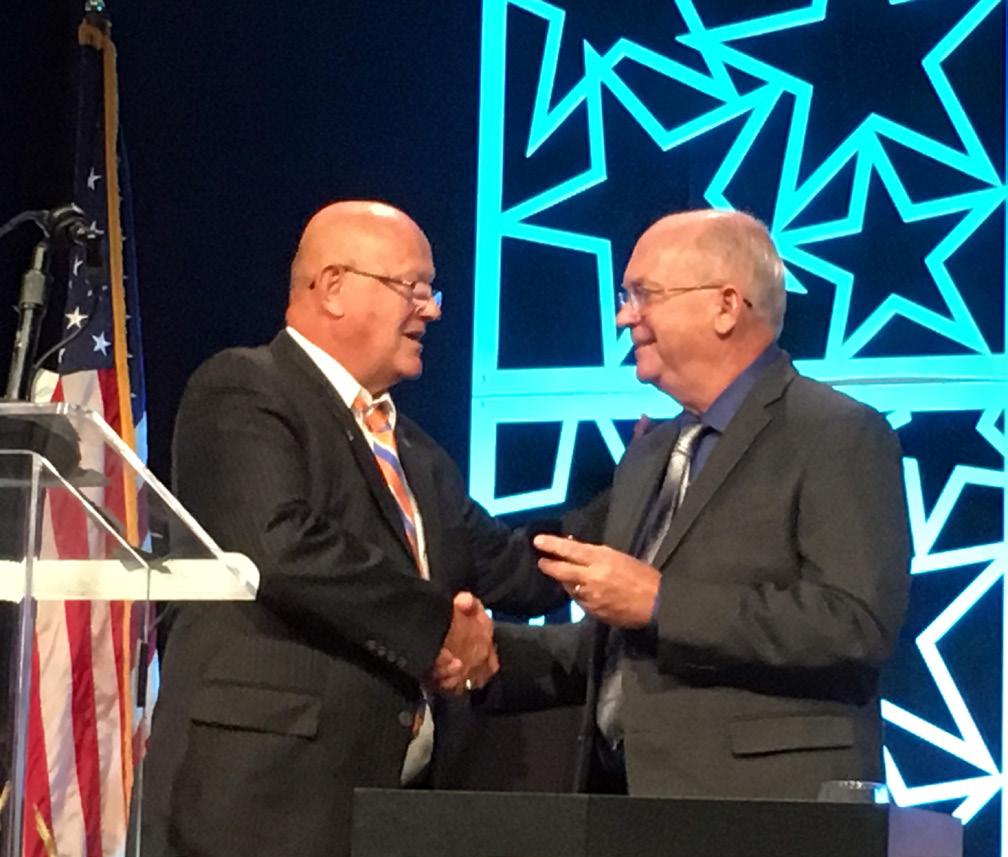
“It made me aware of the fact that there are differences in ‘rural’ wherever you go. I was in a Northeastern state and the Executive Director said, ‘Kent, we really enjoyed you coming. Next time bring an interpreter with you.’ Still, you find that common thread and it all works well. We may all talk a little different from one state to the other, the food might be different, but if it’s a rural association, they’re going to be great people. Whether it be in Texas or anywhere across the nation, you’ll find the best people associated with rural water.”
Watson plans to keep travelling in retirement, to see his kids and their families, who are scattered across Texas and Arkansas; and to meet up
with friends he’s made through rural water nationwide. But he’s also looking forward to spending more time at home, taking care of a ranch that has been in his family for more than 150 years.
“I’m looking forward to working there on the ranch, doing some things that I’ve been wanting to do for a number of years,” Watson said. “Juggling time between that and grandkids.”
That shouldn't be a problem for him. If there's one thing Watson has mastered during his career, it's juggling lots of different responsibilities.
Sheri Dahlberg almost didn't get the job she applied for at Sharyland WSC. She was 19 years old, and a lifelong resident of the Rio Grande Valley who grew up without drinking water service until she was in high school. When she applied at the system for a combination cashier and receptionist position in 1976, she asked to be paid
10 cents more than the minimum wage. The general manager at the time didn't want to give it to her, but another new hire in the office told him to acquiesce because "she thought I would work out," Dahlberg said. "I laugh when I think about it, because who could have known?"
That extra ten cents an hour was the start of a 46-year career, one that comes to an end December 31 with Dahlberg's retirement from Sharyland, where she has been the General Manager for the last 13 years. "When I started here, I had no plan. I didn’t have any career goals. I didn’t know what I was going to do with my life," Dahlberg said. "I never imagined it would turn into a career."
Dahlberg said she learned "everything you might imagine" as she worked her way up the ladder at Sharyland. She became Office Manager in the early 1980s and was promoted again to Assistant Manager by the latter part of that decade. She stayed in that role until 2009, when she was tapped to become the GM.
Her rise mirrors that of Sharyland's. When she started, Dahlberg says, the system was just eight years old and only had approximately 1,500 accounts. Today it has nearly 21,000, despite selling off parts of its original service area to encroaching cities, with much of that growth coming in waves in the early 1980s and into the 2000s. At one point early in her career, Dahlberg says, the system had a waiting list of 6,000 customers as it scrambled to get the funding required for such a colossal expansion. It would eventually get caught up, and would be prepared for future growth, including into the present as new developments continue to move in. "We’ve grown significantly in the last 10 years. I just don’t see where it’s going to stop," Dahlberg says.
For Dahlberg, the challenge wasn't just managing growth, but also the changing expectation as their service area grew closer to the cities that surrounded it. "We're still trying to be true to our values and our roots. It has been a very delicate dance becoming more urban and losing so much of our rural community." Many of the new customers, she said, came with different expectations and more demands.
This is something she says they've seen throughout South Texas, and it's one reason she's grateful for the close relationships the WSCs in that region have fostered. "We count on each other, we consult with each other, and that has been a very comforting way to build your business and grow in a way that is positive for the


community," she said. "I think we’ve all benefitted from that."
Still, some parts of the job each utility has to learn itself. Dahlberg pointed to the challenges of doing legal paperwork and contract details with some of their big accounts; and new developers requiring a level of service that they didn't have in the early years. They worked to give these new customers "the confidence that we were capable and qualified to handle their needs."
The need for additional expertise is one of the things Dahlberg says she's seen change throughout the state during her 46 years in the rural water industry. "There’s no question that rural water systems have had to become much more sophisticated,"



she said. "Hiring everyday people is okay for some positions but now we have to hire more educated personnel, specific to the task at hand. We were all just ordinary people at the beginning," she said. For instance, the 19-year-old who asked for 10 cents over the minimum wage when she started out.
That young woman's rise to leading Sharyland WSC wasn't always easy in a field typically dominated by men. Dahlberg says that she has spent 30 years telling her staff to get comfortable with her outward displays of emotion, something she doubts a male boss would have to do. "Don’t mistake my tears for weakness," she said she has told them. "This isn’t just some girl, some woman who doesn’t know better. This is all passion. My emotions get tied up in the passion. If I didn’t care so much, I could say
all those things without tears."
Dahlberg's passion for rural water is apparent; she couldn't help but get choked up when talking about her career and what it meant to her. "If you don’t love what you’re doing in this business, you don’t stay. If you have a passion for doing good for people in your community and the people that work for you, then you

can serve that way."
In addition to her dedication to her Sharyland WSC community, Dahlberg has been fully engaged in the betterment of the rural water industry in Texas as a whole. She was a regular attendee at TRWA conferences, donated countless items to the PAC to support our legislative efforts, testified on important issues at the Texas legislature and supported various programs.
Dahlberg isn't entirely sure what the next chapter holds for her yet. Her husband, Bubba, also retired recently, and the pair are looking forward to having time to figure out what they want to do next, besides visiting their two children and three grandchildren when possible. Forty-six years later, she once again approaches her next chapter without a plan. It worked out pretty well last time.

 By Paul King
By Paul King
“Do you know of any good water operators we could hire?”
I’ve heard this question for years, so often I now recognize it as two separate questions. The first is, “Do you know of any good water operators?” That answer will always be yes.
I know many great operators that do their job and do it well. They are oncall 24/7, 365 days of the year. They keep their water customers in service every day.
The second question, the harder one, is “Can we hire any of them?” That’s where I shrug my shoulders and say I do not know. Systems ought to keep their good employees happy, and happy employees don’t often look for another job. So, who does?
I began asking water system managers what reasons most employees
give for leaving employment. The number one answer is always, “I am leaving to make more money.” The number two answer is, “There’s no opportunity for growth in my current position.” If you’re looking to keep your employees, those are the top two problems that you need to solve.
Because there are financial and organizational implications to them, any employee retention strategy needs to start at the top, incorporating the board of directors and senior management. I once knew an assistant manager at a water system that took it upon himself to start evaluating employees twice a year. He thought if he could explain to his employees what they were doing wrong halfway through the year, it would give these employees time to improve and earn salary increases
based on their year-end evaluations. Unfortunately, this assistant manager didn’t have board buy-in and the board suspended pay increases that year, ruining his plan.
The single-best way to retain employees is to compensate them competitively. Boards of Directors and general managers need to evaluate and adjust salaries regularly. If your system can’t increase pay right now, consider providing other forms of compensation, such as bonuses, improved health care benefits and retirement plans. These things can help raise employee morale also.
In addition to competitive pay, it’s important to support employees’ growth. Access to training is important for the personal and professional development of employees. If your
You can make your system an attractive place to work for
system has salary increases built in for attaining higher licenses, it is vital that employees be supported as they take the classes needed to get these licenses. Virtual classes have made these more accessible, but employees need to be able to learn in a way that works for their age and learning style. New employees joining without previous experience can jumpstart their careers in this way.
Cross training is another way to keep employees engaged and benefit the utility at the same time. Many small systems have office professionals that step out of their usual roles for a few hours a week and ride along with the system operators to get a better idea of what their coworkers do daily. This experience prompts many of them to take the classes and tests needed to obtain their
water license. Office professionals can also train operators to take and post payments in the billing systems. This cross training has helped these systems during the recent pandemic. When office staff were out sick, an operator could step in to take payments, and when the operator missed time, the system still had a licensed operator on staff. These types of programs can give employees a sense of accomplishment that’s above and beyond performing their daily duties.
Talk to your staff regularly to learn their career goals and interests and identify new training needs and opportunities that can be of benefit to your water system. These can work well together. If you need a new customer service inspector or back flow assembly tester, you may already have someone in your employ who can

train to fill these roles and who would enjoy the challenge and change of pace these new duties would provide.
Retention begins from the moment a new hire comes on board, beginning with proper onboarding and orientation to set new hires up for success. Teaching new employees about their job and how they can contribute and thrive in their position will help give that employee a sense of belonging as they begin their new position, rather than putting them in a place where they might feel overwhelmed. And remember, teaching can go both ways. New employees will feel valued when their ideas are listened to. Sometimes the fresh eyes a new hire brings can spot problems those of us who have been looking at it for years don’t recognize.
employees want to stay at, but they have to start at the top
current employees, but retention has to start at the top
It’s important to have written job descriptions and a clear outline of responsibilities to make sure new employees understand management expectations. In the previous issue of Quench (Issue 5, 2022), Charles Perkins wrote about how O&M manuals and SOPs should be living documents that are updated all the time. Job descriptions are the same. They should be reviewed periodically and should grow as your system grows. Attorney Ann Price wrote an article for Issue 4, 2022 of Quench about composing clear and precise job descriptions.
Many new employees will ride along and be mentored by other employees. This mentoring is great in a remote work environment like rural water operations. Mentors need to be happy, well-adjusted employees
that have a high job satisfaction. Mentoring is not a job for individuals with bad attitudes as it can lead to the new employee developing a bad attitude also.
Time constraints on employees are another issue that can be addressed by management. Being on-call is a major but necessary burden of many utility positions, so systems can improve morale by maintaining flexibility with scheduling both these on-call shifts and regular working hours.
Years ago, I had an employee whose son played high school football. We made an arrangement that allowed him to change his on-call shifts during his son’s games. We were able to help him prioritize what mattered to him, and as a result he was very willing to help others when they had

other obligations.
Creating a culture of employee retention starts at the top. Happy, well-adjusted employees that have high job satisfaction rarely leave. If you can orient and mentor new employees to your system’s culture, compensate your employees as best you can and help them develop new skills and grow into new roles when available, they will be more likely to remain content in their positions, giving your system better employee retention and better business performance.
Paul King is a Circuit Rider at TRWA.







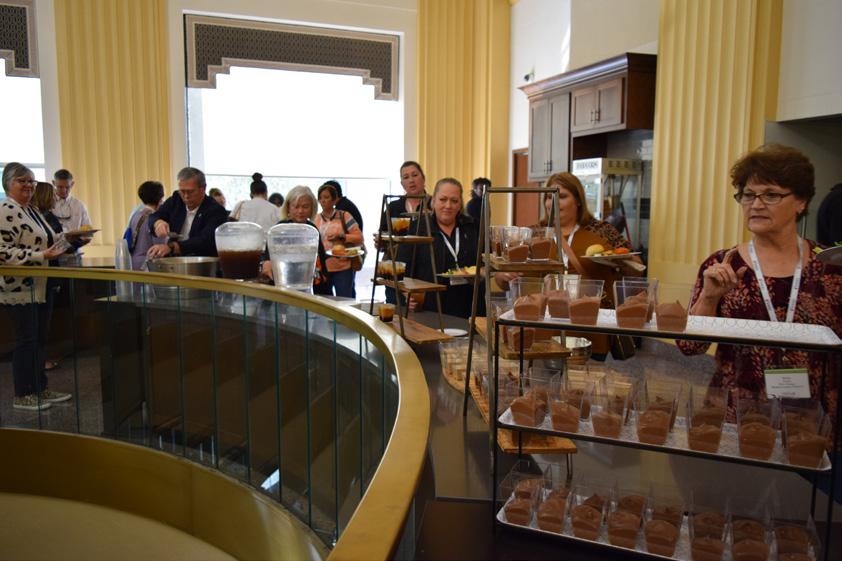



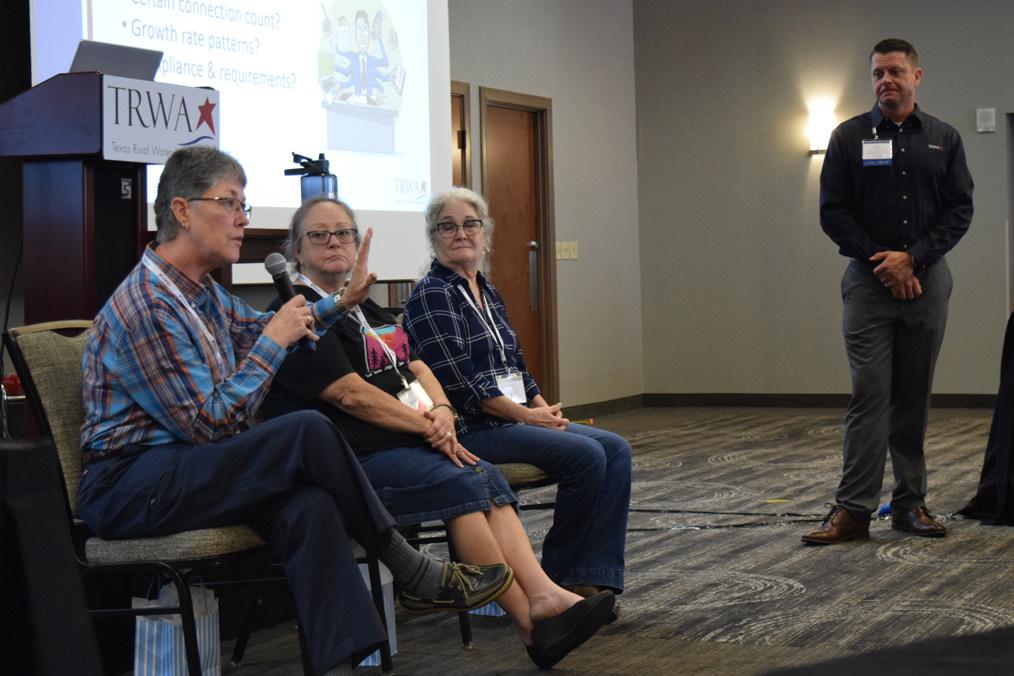



 By Nathan Cantrell
By Nathan Cantrell
The more I learn about PFAS, the more I wish I had retired before I ever heard of them.
The rise of concern over per- and polyfluoroalkyl substances (PFAS) has been one of the biggest developments our field has seen over the past several years, one that’s required a whole new body of knowledge. Fortunately, if that’s the right word, the attention being paid to PFAS rose at approximately the same time as the arrival of the COVID-19 pandemic, meaning some of us, your truly included, were stuck at home with a lot of time for research. Over the past three or so years I have read so many articles and watched so many videos, webinars and presentations on PFAS it makes my head spin. My household is sick of hearing about them; even a commercial for cookware
elicits a groan at this point lest it set me off.
What’s most frustrating about PFAS is that even three years in to learning about them, there’s still so much that remains unknown. Scientists are still testing and improving upon the ways that we detect the chemicals in water and soil. Treatment options are also being explored in places where contamination is found. And we’re still working out exactly how they impact both the human body and the environment, though early results are not good.
PFAS are synthetic chemicals that have been manufactured and used in a broad range of industries since the 1940s. Recent inventories list more
than 4,700 different PFAS that could have been used or are still being used around the globe.
PFAS are used in many applications because of their unique physical properties such as resistance to high and low temperatures, resistance to degradation and nonstick characteristics. But the properties that make them so durable also make them a health and environmental concern. Their slow breakdown means they can continue to be found in the air, soil and water long after exposure. The same holds true for the human body. Due to their widespread use and persistence in the environment, most people in the United States have been exposed to PFAS. PFAS are still used in many industries, and even as they are being phased out, it's possible that the replacements may also be harmful to the environment.
What we know and what we still need to learn about these 'forever chemicals'
The U.S. Environmental Protection Agency (EPA) issued health advisories targeting four variants of PFAS chemicals in the summer of 2022. These advisories considered negative health effects to lifetime exposure of these specific PFAS chemicals in extremely small quantities in drinking water, which is what makes this such an urgent problem for water utilities to address.
What are water utilities doing about it?
Many water systems in Texas have begun receiving notifications and instructions from the EPA to collect samples for 29 different per- and polyfluoroalkyl substances and lithium, as required by the Safe Drinking Water Act (SDWA). The SDWA requires that once every five years EPA issue a list of unregulated contaminants to be monitored by public water systems, called the Unregulated Contaminant Monitoring Rule. (This is the fifth such list, so UCMR 5.) As proposed, and if funds are appropriated by Congress, all public water systems serving 3,300 or more people and 800 representative public water systems serving fewer than 3,300 would collect samples during a 12-month period between January 2023 and December 2025. The data collected from these water systems are needed to conduct state and local assessments of contamination, including analyses of potential

environmental justice impacts.
EPA will continue to prioritize additional PFAS for inclusion in UCMR 6 and beyond, as techniques to measure these additional substances in drinking water are developed and validated. Methods of treating and remediating surface and groundwater are also under development. You can find more information on these methods both for testing and treatment from the EPA at trwa.org/pfasepa.
The National Rural Water Association is also inviting systems to participate in the PFAS Cost Recovery Program. See the sidebar for more information.
With a subject matter this complicated, there’s always new information, new methods or new warnings coming down the pipe. Even if I could learn everything there is to know about PFAS before retiring, the week after that, the knowledge would be out of date. That’s intimidating and inconvenient, but it comes with the territory.
Nathan Cantrell is a Wastewater Technician at TRWA.
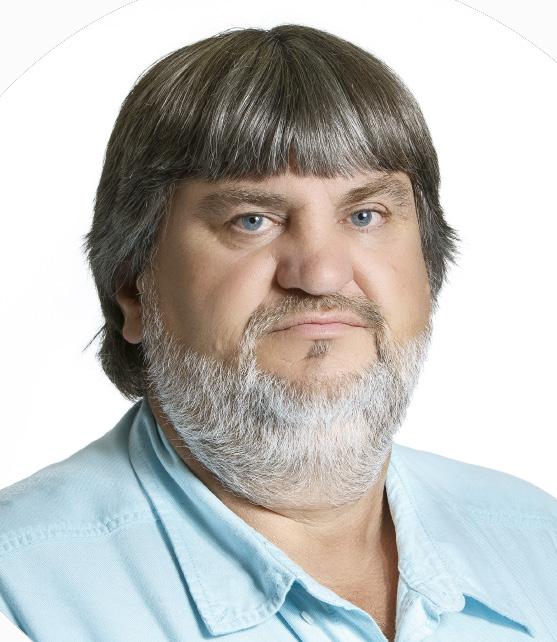
TRWA has invited member systems to participate in NRWA's PFAS Cost Recovery Program, a multi-district lawsuit against manufacturers of PFAS.
If you are concerned that your system's water supply will be impacted by PFAS and would like to be a plaintiff, you may register your utility at www.napolilaw.com/ nrwa-pfas.
If your system is one of the more than 110 Texas utilities that has already registered, but you have not completed your retainer and other paperwork, you must finish that process in order to be eligible for any settlement.
Here are a few things to know about the litigation:
1. The action is cost recovery, not punitive.
2. The litigation is filed against the global manufacturers of the compounds and does not impact local companies who may have used them.
3. There is zero upfront cost to register, however, a system must be registered prior to any settlement or judgement being reached in order to benefit. While there is no timeframe as to when a settlement may be finalized, those settlement talks are underway. The 2022 summer health advisory from EPA has placed pressure on the manufacturers to reach a settlement.
See trwa.org/pfas-litigation for more details.
So much of our work in wastewater happens after it reaches the treatment plant that sometimes we, and certainly the public, can forget the effort it takes to get it there.


Most of our collection systems that move wastewater from the point of origin to the treatment facility are buried underground. Our laterals, mains and trunk lines, the manholes and lift or pump stations are out of sight and too often out of mind. But the safe transport of wastewater away from population centers is a crucial component of civilization. Outbreaks of epic proportion have been caused by the improper
conveyance and treatment of wastewater. The Roman Empire built vast infrastructure to channel wastewater away. Tens of thousands of people died in 19th century London every year before the sewer system was modernized. Native American and other nomadic peoples stayed on the move not just to follow their food supply but also to leave their waste behind them and give nature time to break it down.
But we often forget about this effort in modern times, at least until Murphy’s Law rears its head and something goes wrong. Collection systems can be made of many different types of materials, but no matter what they’re made of, if we fail to take care of them and keep them in good repair, we’re asking for trouble.
Having worked for large and small systems in my 46-year career, I know that it’s easier for a larger system with more manpower to keep their collection systems well-maintained. When I worked as the lone water and wastewater operator at a small system, it was tough to find the time during the day to allot to the maintenance of the collection systems.
This is where planning can play a big part. All wastewater systems, regardless of size, need to dedicate time to simple checks and maintenance. A schedule of doing smoke testing, at least in portions of the system where there could be potential problems, can save a world of hurt later. Divide your system into sections, be it north or south or 4 quadrants or whatever makes sense for your geography, and dedicate the time to check the entire collection system, even if it takes a year or more to complete. You may be surprised at what you find.
Smoke testing is a relatively inexpensive operation, but it does involve a considerable amount time and personnel. I’d advise that smaller systems ask Council Members or the Board of Directors to volunteer for the process. It will give them firsthand knowledge of the issues they will be called on to address financially later.

In most cases all that is needed are smoke bombs, a motor blower designed to fit a manhole, a few sewer line inflatable plugs to control the areas to be smoked, and personnel to walk the areas that are being smoked. You then need to record addresses and locations where smoke appears. The smoke will usually appear where cracks have formed in pipes or joints; places where pipes are misaligned; at unauthorized connections, like house rain gutters connected to a clean-out; where there may be abandoned taps or connections; and at older brick-style manholes. Once the documentation has been gathered and a list of areas has been determined, the system can then prioritize the areas that need the most attention.
Other valuable bits of maintenance include cleaning the main line, manholes, and lift stations. With the use of water jetting machines, these components can be cleaned utilizing pressure water. Jetting out mains will help keep customerrelated issues to a minimum, but the job needs to be done thoroughly, from the treatment facility out to the far ends of the system. This is somewhat time-consuming but can be eased by having an additional source of water, such as any water-carrying vehicle, to save time hauling the jetter to a filling station and back. Don’t ignore your lift stations
during the line jetting. These should be cleaned, including the side walls, during the water jetting to help alleviate possible blockages. If you are a small system and don’t have access to a jetter, check with a surrounding city or other utility to see if you can arrange to borrow or swap some service in repayment for a borrowed unit. Renting one is also a possibility, though due to cost I’d only recommend this if you have an immediate problem that needs to be addressed.
These preventative measures take time and effort, but spotting problems early can save you and your system a world of headache later. By making sure your collection system is in good condition, you can keep it out of the customer’s mind.
Quentin Turner is an FMT specialist at TRWA.


 By Justin Guerra
By Justin Guerra
(GIS) is used to create, manage, analyze and map all types of data. Paper maps might use lines and colors to code elevation, climate or political subdivision for the reader; the technology of GIS can layer location data with multiple layers of descriptive information. This provides a foundation for mapping and analysis that is used in science and almost every industry. If you’ve searched the Internet for coffee shops near you, then you were using GIS to access business information correlated to a particular geographic area.
GIS has added a totally new degree of practicality to the asset management of public water systems (PWS). There are so many hidden and moving parts to a PWS: each main, lateral, valve, pressure zone, fitting and other field asset needs to be tracked. GIS can trace complex networks like these and record a wide range of useful
additional data about each component and how they interact. It can take individual structures such as pumps, open them up, and show the assets within. Spatial data can be incorporated from a broad range of sources, including asbuilts; field surveys; closed-circuit television; flow meters and aerial imaging. Geospatially-empowered technologies like the ArcGIS Utility Network can analyze how the network is affected by real-world events such as storms, outages or equipment failure.
The benefit of thorough, accurate GIS mapping is so great that TRWA has launched its own services to help members establish accurate and precise maps of their water and/ or sewer infrastructure to initiate improvement of asset management practices and capital improvement planning. Spearheaded by Deputy Executive Director Jason Knobloch, the program is designed to: (1) anticipate future infrastructure problems,
Offictem. De

etusdae
needs, or changes; (2) set standards for the assessment, maintenance, and rehabilitation of underground infrastructure and (3) provide viable solutions through education, technical resources and industry advocacy.
With aging infrastructure, increase in water demand, and a generation of knowledgeable operators retiring from the industry; it is now more important than ever to understand our water and sewer infrastructure. GIS mapping standardizes the collection of data for a system, making it easier to compare the condition of infrastructure pieces across the network, including where a certain component is located, when it was installed, who is responsible for it, how is it networked, and what are its unique features. The data produced from this inquiry is fundamental for performing maintenance, arranging development, and expanding the system.
One type of project TRWA is using this technology for is assessing water service meters in accordance with EPA’s and TCEQ’s Lead and Copper Rule (LCRR). Under the updated LCRR, systems must identify and track information on service line materials as they are encountered during normal operations (40 CFR §141.84(a) (5)). These investigations may result in service line repair or replacement recommendations. One method to facilitate this mandate combines visual inspection at the meter pit, the use of electronic field data collection and inventory updates through GIS applications.
By assuring that data gathered from a meter pit is collected and coded in a consistent and reliable manner, conflicting information can be resolved, and service line repair or replacement can be prioritized properly to reduce the risk of lead contamination. "Without GIS, the upcoming EPA mandates for LCRR/LCRI would be a much more daunting task," said Mauriceville MUD's Whintony Estes. "GIS allows us to inventory, identify and implement our lead service line replacement plans all in one place. The health and safety of our community will be improved exponentially as we execute this project quickly and efficiently."
More broadly, TRWA’s GIS and mapping services aim to bridge the knowledge gaps that are being created in our industry as long-time operators and managers retire. Systems that might have run on institutional knowledge for years will need current maps and detailed lists of their assets going forward. Since 2018, we have completed multiple projects for our members to improve day-to-day operations and assist with planning for the future, including our work in South Cleveland WSC. There, after working with TRWA, office staff now use GIS data to determine the location and sizes of lines and measure out line extensions. This helps them coordinate projects with contractors, work with the county appraisal district to identify ownership and propose needed system improvements to their board. “We are so pleased with this tool, and I can't imagine how we functioned before we had it. It is truly the best money we have ever spent on our system,” said South Cleveland WSC's Cookie McKee.
If you are interested in learning more about how GIS can help your system or have any questions about this article, contact TRWA’s Justin Guerra for more information. Our staff can set up customized options to fit your needs and will provide training to ensure you have the ability to continue managing your assets through GIS on your own.
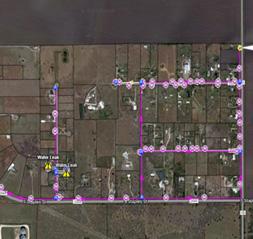

Justin Guerra is a Member Services Specialist at TRWA, specializing in GIS and mapping and drone work.


TRWA is now accepting applications for the 2023-2024 cohort of our Emerging Leaders Program.
This program is designed to cultivate energetic and engaged individuals who are invested in the future of rural water, particularly early- to mid-career working professionals currently employed by a TRWA member utility system.

The Emerging Leaders Program is a nine-month long professional development and networking opportunity that aims to enhance individual leadership skills and prepare participants to be active and engaged community leaders and advocates for rural water issues. Participants will take part in three in-person trainings, webinars, local projects and receive one-on-one coaching from experienced industry mentors.
This program combines in-person training and remote learning to accomplish the following defined goals:
• Identify, develop and engage emerging leaders in the Texas water industry and in TRWA
• Develop resources for grassroots advocacy, fundraising and industry promotion
• Achieve heightened engagement and commitment to the industry and to the Association
Program Elements Include:
• Three In-Person Trainings
• June 5-6, 2023 in Austin (Mandatory)
• October 5-6, 2023 in San Antonio (Encouraged) • January 16-17, 2024 in Austin (Mandatory) • One-on-One Coaching Sessions • Peer Forum Discussions • Two Webinars • Local Project Implementation
Visit trwa.org/ELP for more information and the find the online application.
The Texas Rural Water Foundation is now accepting applications for our Student Scholarships for the 20232024 academic year.
This year, TRWF is using a new online platform for scholarship submissions, which will make applying easier for students. You can find the link to the platform on our Student Scholarship page at trwa.org/student-scholarships.
The TRWF Scholarship Committee is
particularly interested in supporting students who seek a career relating to the water and/or wastewater industry or a career that will support rural Texas, especially veterans who are pursuing these same career goals. Former student scholarship recipients are invited to apply for a continued scholarship.
All applications must be submitted in full by 5 p.m. on February 6, 2023. If you have any questions, email foundation@ trwa.org.
Submit your nominations for TRWA's Awards of Excellence today! We're accepting nominations in three individual categories:
• Excellence in Administration
• Excellence in System Management
• Excellence in Operations
As well as two systemwide categories:
• Small System Excellence (1,500 or fewer connections)
• Large System Excellence (More than 1,500)
Get more information or
start your nomination now by visiting trwa.org/awards for individual awards and trwa.org/systemawards for system awards. Individual winners receive a $500 prize, while system winners receive a $1,000 prize.
Anyone can nominate an individual or a system, but please remember eligibility is limited to TRWA members and their employees. Former award winners are not eligible. All entries must be submitted or postmarked by January 30, 2023, to be considered.
Join the conversation at: www.facebook.com/TexasRuralWaterAssn

Find us at @TexasRuralWater for industry and legislative news relevant to you!

TRWA has added a pair of new faces to our field staff in the final months of the year.
First, in late October, we had Barry Dobbs join us in a new role as our Wastewater Training and Technical Assistance Specialist, providing training as well as technical assistance to
systems under 10,000 population, with a particular focus on regulations and compliance, financial and management best practices, emergency planning and operations.

Barry joins TRWA with a Class A Water License and a Class B Wastewater License and 14 years of experience in the water and wastewater field. He is also a certified firefighter. Barry lives in the Bastrop area, and has recently begun taking up disc golf as a hobby.


In November, Gene Estoll joined as our new Wastewater Technician. A native of Mineola, Texas who still resides there, Gene started in the water and wastewater fields in 1993, working his way up through the training and experience necessary until he earned
TCEQ Class A Licenses in both Water and Wastewater, as well as Customer Service Inspector and Backflow Prevention Assembly Tester licenses. Before joining TRWA, Gene spent the last 13 years of his career with Liberty Utilities.
In his spare time, Gene enjoys working on his home in Mineola as well as hunting and fishing when he gets the chance. Most of all, he appreciates spending time with his family, including his two sons and granddaughter.

















